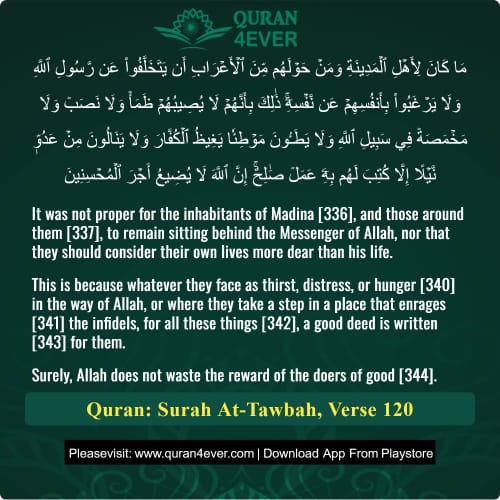
Transliteration:( Maa kaana li ahlil Madeenati wa man hawlahum minal A'raabi ai yatakhallafoo 'ar-Rasoolil laahi wa laa yarghaboo bi anfusihim 'an nafsih; zaalika bi annahum laa yuseebuhum zama unw wa laa nasabunw wa laa makhmasatun fee sabeelil laahi wa laa yata'oona mawti'ai yagheezul kuffaara wa laa yanaaloona min 'aduwwin nailan illaa kutiba lahum bihee 'amalun saalih; innal laaha laa yudee'u ajral muhsineen )
“It was not proper for the inhabitants of Madina [336], and those around them [337], to remain sitting behind the Messenger of Allah, nor that they should consider their own lives more dear than his life. This is because whatever they face as thirst, distress, or hunger [340] in the way of Allah, or where they take a step in a place that enrages [341] the infidels, for all these things [342], a good deed is written [343] for them. Surely, Allah does not waste the reward of the doers of good [344].”
The inhabitants of Madina include both the Muhajireen (Emigrants) and the Ansaar (Helpers). From this, two rulings emerge:
Those who emigrate to Madina and live there sincerely with faith are counted among its people.
If a poor Muslim performs Hajj, it is valid, because on arriving in Makkah, one becomes a resident, and for a Makkan, wealth is not a condition for Hajj.
This refers to the time of the Battle of Tabuk, when it was obligatory upon every resident of Madina, whether from the Muhajireen or Ansaar, to accompany the Holy Prophet ﷺ on the journey.
Exemption applied only to those with legitimate reasons such as old age, illness, childhood, or when the Holy Prophet ﷺ himself commanded someone to stay as his deputy. For example, Hazrat Uthman (RA) missed the Battle of Badr, and Hazrat Ali (RA) was left behind during Tabuk by the Prophet's instruction.
It was compulsory upon them to sacrifice their lives for the Holy Prophet ﷺ, just as a moth sacrifices itself for the flame. No one should have considered their own comfort above his safety.
This includes Holy War, fasting, Hajj, and journeys to seek knowledge, but in this context, it clearly refers to Jihad. Every hardship—thirst, hunger, or fatigue—suffered in the path of Allah is spiritually counted.
This refers to entering the lands of disbelievers as victors, which burns their hearts. This teaches that just as pleasing the friends of Allah is a form of worship, displeasing His enemies is also a meritorious act.
Includes acts like injuring the enemy, capturing them, seizing their war spoils, etc. All these are considered worship in the path of Allah.
Every action of a Muslim soldier is counted as worship. According to Hadith, it is hoped from the mercy of Allah that the same reward applies to those who travel for Hajj or knowledge, as these are journeys in the path of Allah.
This verse confirms that Jihad is an exalted form of worship, and those who engage in it are benefactors of both believers and non-believers. The reward is never wasted, as Allah values every effort made in His cause.
120. It was neither befitting for the people of Al-Madinah and the bedouins of the neighborhood to remain behind Allah’s Messenger nor to prefer their own lives to his life. That is because they suffer neither Zama’ nor Nasab, nor Makhmasah in the cause of Allah, nor did they take any step to raise the anger of disbelievers nor inflict any injury upon an enemy, but is written to their credit as a deed of righteousness. Surely, Allah wastes not the reward of the doers of good.
Allah, the Exalted and Most Honored, criticizes the people of Al-Madinah and the bedouins around it, who did not participate in the battle of Tabuk with the Messenger of Allah . They sought to preserve themselves rather than comfort the Messenger during the hardship that he suffered in that battle. They incurred a loss in their share of the reward, since,
(they suffer neither Zama’), thirst,
(nor Nasab), fatigue,
(nor Makhmasah), hunger,
(nor they take any step to raise the anger of disbelievers), by strategies of war that would terrify their enemy,
(nor inflict), a defeat on the enemy,
(but is written to their credit) as compensation for these steps that are not under their control, but a consequence of performing good deeds that earn them tremendous rewards,
(Surely, Allah wastes not the reward of the doers of good.) Allah said in a similar Ayah,
(Certainly We shall not make the reward of anyone who does his (righteous) deeds in the most perfect manner to be lost)
(9:120) It did not behove the people of Madinah and the bedouin Arabs around them that they should refrain from accompanying the Messenger of Allah and stay behind and prefer their own security to his. For whenever they suffer from thirst or weariness or hunger in the Way of Allah, and whenever they tread a place which enrages the unbelievers (whenever anything of this comes to pass), a good deed is recorded in their favour. Allah does not cause the work of the doers of good to go to waste.
There is no commentary by Abul Maududi available for this verse.
[507]- In times of hardship. Rather, they should have been willing to endure with the Prophet (ﷺ) whatever was necessary for Islām.

For a faster and smoother experience,
install our mobile app now.
Related Ayat(Verses)/Topics